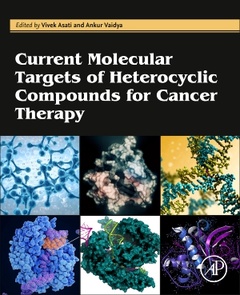Current Molecular Targets of Heterocyclic Compounds for Cancer Therapy
Coordonnateurs : Asati Vivek, Vaidya Ankur

Current Molecular Targets of Heterocyclic Compounds for Cancer Therapy discusses recently developed treatments based on molecular targets which are genetically altered in cancer cells and are essential for tumor development and survival. Considerable research effort has been devoted to the development of targeted drugs that inhibit the action of pathogenic kinases, and clinical studies performed so far have validated the positive effects of kinase inhibitors for cancer treatment. Each chapter discusses a molecular target, such as ALK2, ATR, CK, Src-Abl, EGFR, Fyn-Blk-Lyn, IGFs, and PAK1. The book's chapters are written by experts who actively work on the targets to help readers fully understand how they can be used. This is a valuable resource for cancer researchers, oncologists, graduate students and members of the biomedical field who are interested in the potential of novel cancer therapies based on molecular targets.
2. Ataxia telangiectasia and Rad3-related protein?(ATR)
3. Breakpoint cluster region protein (BCR-AbL)
4. Casein kinase (CK)
5. c-Src kinase/Src-Abl
6. Cyclin dependent kinase 4 and 6
7. Epidermal growth factor receptor (EGFR)
8. Fyn-Blk-Lyn
9. Insulin-like growth factor (IGFs)
10. Mitotic kinesin spindle protein (KSP/Eg5 ATPase)
11. p21-activated kinase 1 (PAK1)
12. p38 mitogen-activated protein (MAP) kinase
13. Proviral integration site for Moloney murine leukemia virus-1?(PIM-1) kinase
14. Rearranged during Transfection (RET)
15. Serine/threonine-protein kinase B-Raf
16. Tubulin polymerization
17. Tumor necrosis factor receptor associated protein 1 (TRAP1)
18. Vascular Endothelial Growth Factor Receptors (VEGFR/PDGFR)
Dr. Ankur Vaidya did his graduation, post-graduation and PhD from Dept. of Pharmaceutical Sciences, Dr. H. S. Gour University, Sagar (M.P.) in 2004, 2008 and 2013 respectively. Dr. Vaidya has a teaching and research experience of many years and is currently working as Asst. Professor in Faculty of Pharmacy UPUMS, Saifai, Etawah (U.P.) India. Dr. Ankur has a key research interest in discovery of new anticancer agents with novel targets and published dozens outstanding publications in various International journals. Dr Vaidya has credited as reviewer of international journals of repute in the field of Pharmaceutical sciences. Dr. Ankur has guided several postgraduate theses and was also the recipient of AICTE-NDF (National Doctorate Fellowship) fellowship for PhD research project. Dr. Vaidya has published nternational book chapters, one International book authored and 1 national book. Dr. Ankur has participated/presented in various National and International conferences.
- Discusses recently discovered molecular targets for cancer therapy
- Brings updated literature of heterocyclic compounds, an important construction motif for the development of new anticancer drugs
- Encompasses comprehensive compilation of recently introduced anticancer drugs in the market and their health outcomes and pharmacoeconomics
Date de parution : 04-2024
Ouvrage de 502 p.
19x23.3 cm
Thème de Current Molecular Targets of Heterocyclic Compounds for... :
Mots-clés :
Cancer; molecular target; protein kinase; ALK2; ATR; CK; Src-Abl; EGFR; Fyn-Blk-Lyn; IGFs; PAK1; cancer treatment; tumor development
